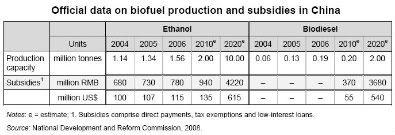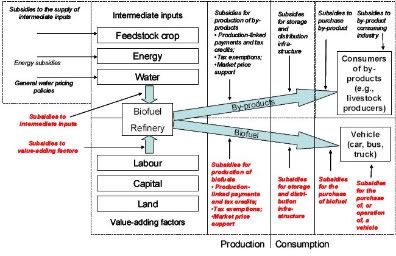GSI report: China's biofuel subsidies need rethink

Subsidies provided at different points in the biofuel supply chain
Biofuels – At What Cost? Government support for ethanol and biodiesel in China [*.pdf], is the latest in a series of country studies on subsidies for biofuels by the Global Subsidies Initiative (GSI), a Geneva-based programme of the International Institute for Sustainable Development (IISD). (See previous posts on the GSI's reports on biofuel subsidies in the US, and EU support measures).A domestic biofuels industry seemed an attractive option to Beijing as a means of improving energy supply for China’s soaring transport needs, reducing air pollution and building a “new socialist countryside” by creating alternative markets for grain and opportunities in China’s poor rural areas.
However, the government quickly recognised the inherent conflict between first generation biofuels and food production. It is now in the awkward position of seeking to discourage the use of staple crops for biofuels production, yet at the same time paying production subsidies predominantly to ethanol producers using maize and wheat as feedstocks. The construction of new maize-based ethanol plants has been halted. Policies have been developed to encourage the production of biofuels from non-grain feedstocks instead, grown on 35 to 75 million hectares of marginal land that might be suitable for these crops.
According to the report, the impacts of converting “marginal lands” to feedstock production will depend on local circumstances. Benefits could include higher farm incomes and rehabilitation of degraded land. However, in some areas yields might be too low to make growing of feedstock profitable, and government subsidies would be wasted on such land. Negative impacts could also arise if existing land users are displaced or natural ecosystems are disrupted. Subsidies for growing biofuel feedstocks on marginal land are higher than subsidies for setting aside such land for environmental purposes, encouraging cultivation of conservation areas:
 energy :: sustainability :: ethanol :: biodiesel :: biofuels :: land-use change :: rural development :: social impact :: subsidies :: China ::
energy :: sustainability :: ethanol :: biodiesel :: biofuels :: land-use change :: rural development :: social impact :: subsidies :: China :: Even under the most optimistic scenarios for Chinese biofuel production, soaring private vehicle ownership means domestic production of biofuels would have a negligible effect in reducing China’s oil consumption or increasing energy security. The net benefits for pollution reduction also appear to be limited and the potential for negative unintended consequences is high, including for vulnerable rural communities. The report therefore recommends that the Chinese Government re-evaluates its biofuel policies, particularly to ensure that biofuels genuinely do not compete with food or undermine the government’s social or environmental objectives.
More generally, China should hasten the liberalization of transport fuel prices. China’s current price caps undermine the government’s energy-efficiency goals. If improving energy security and reducing urban pollution are genuine priorities, then allowing domestic fuel prices to rise to those established in international markets would be the most effective step that China could take to curb demand, particularly if such action is accompanied by policies to improve vehicle efficiency and slow growth in car ownership.
References:
Global Subsidies Initiative: "Biofuels – At What Cost? Government support for ethanol and biodiesel in China" - November 2009.
Biopact: Subsidies for uncompetitive U.S. biofuels cost taxpayers billions - report - October 26, 2006
Biopact: IISD report challenges EU biofuel subsidies, calls for end to tariff - October 04, 2007
 --------------
--------------
 Taiwan's Feng Chia University has succeeded in boosting the production of hydrogen from biomass to 15 liters per hour, one of the world's highest biohydrogen production rates, a researcher at the university said Friday. The research team managed to produce hydrogen and carbon dioxide (which can be captured and stored) from the fermentation of different strains of anaerobes in a sugar cane-based liquefied mixture. The highest yield was obtained by the Clostridium bacterium.
Taiwan's Feng Chia University has succeeded in boosting the production of hydrogen from biomass to 15 liters per hour, one of the world's highest biohydrogen production rates, a researcher at the university said Friday. The research team managed to produce hydrogen and carbon dioxide (which can be captured and stored) from the fermentation of different strains of anaerobes in a sugar cane-based liquefied mixture. The highest yield was obtained by the Clostridium bacterium.









0 Comments:
Post a Comment
Links to this post:
Create a Link
<< Home